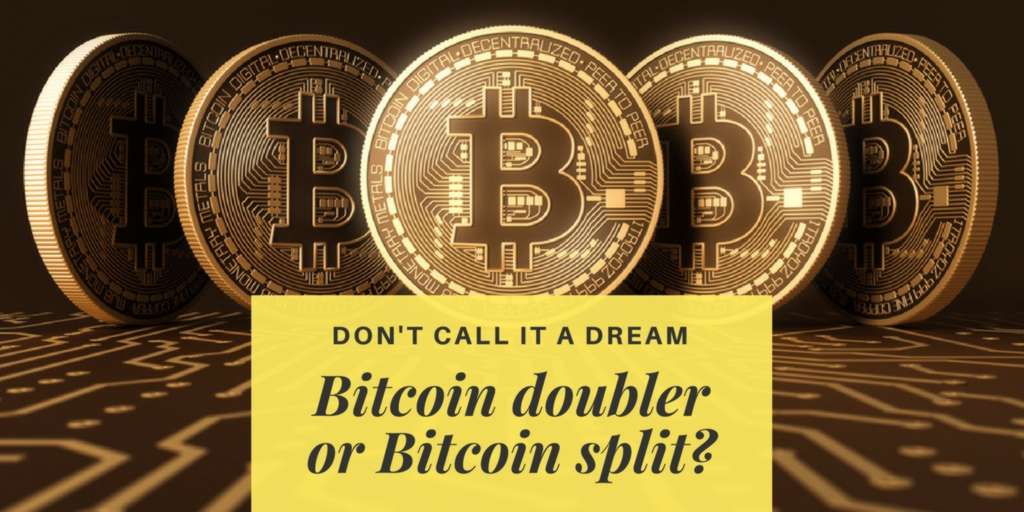What does Bitcoin doubler o Bitcoin split means? – Luca Venturella

Meaning of "Bitcoin doubler" or "Bitcoin split"
The literal meaning is clear enough, which means you are looking to double your Bitcoins thanks to a “hard fork” (split) provided for the Bitcoin blockchain. It seems like a dream, but in part it is not. In essence to understand the meaning of these terminologies and understand the consequences, we must ask ourselves three questions, whose answers are not as obvious as it seems. Because it is not correct to say that “our Bitcoins will double”.
What need to make it possible to double the Bitcoins?
To answer this question, we must first take a step back and think, in a simplified way, what a blockchain is.
It is a digital, public record, immutable in the past, where all the transactions are written, the transaction history, since the beginning of the publication to now.
This ledger is shared via internet between the various actors in the network, the nodes, which contain an identical copy of the ledger each of them. Each Bitcoin transaction consists essentially of the sender address, the recipient address and the amount of Bitcoin to be transferred.
Each “address”, which is equivalent to a wallet, is an alphanumeric code with a length between 26 and 34 characters (usually of 34 characters) and is unique in the blockchain network.
Stop now by thinking about the fact that if you could split the blockchain at some point, you would have two identical wallets on two identical (until then) separate blockchains. And this is what happens when we talk about Bitcoin split (or about an hard fork).
The Bitcoin blockchain is doubled, leaning on equal or different nodes does not matter, but clones and separates, living on its own life from that moment on. The new Bitcoin blockchain will take on a new name, as happened with the recent spin-off in Bitcoin Gold. The original blockchain will remain, as if nothing had happened.
What should you do to be ready for a Bitcoin split?
We have said that a hard fork, or split, therefore provides for the creation of a new blockchain, totally separate from the original. So it is, in fact, a new currency (Bitcoin Gold for example), although it contains the transaction history of the original currency (Bitcoin for example).
The zero step is to remember to never give to anyone the private key of your wallet. If you’re not sure what you’re doing, don’t do it. There are two different cases to consider:
- Your wallet is stored to an exchange (which controls the private key of the wallet)
- Or, only you have the control of the private key of the wallet
The simplest case is the second one. Suppose that you have a “cold storage” wallet or you have a software to manage wallets like Electrum. In that case, your private key is safe and you must immediately understand that there is no rush to take control of the wallet with the new coin (born from the Bitcoin split for example). Only you are the rightful owner, thanks to your private key, so nobody can use or steal your “new” Bitcoins.
You will have to wait a couple of days to make sure you can use the wallet with the new coin, with a certain “technical” tranquility.
In the first case, however, the exchanges that keep your private key are not legally bound to give you access to the corresponding wallet of the new currency. So you should always refer to your exchange to request this clarification, but above all you should trust it. Alternatively, you should move everything to another wallet before splitting.
Can only Bitcoins be doubled? Does this also apply to other cryptocurrencies?
Yes, let’s say that in general these considerations also apply to other coins (other blockchains). It depends on how the split is considered. If this is only a protocol update (for Bitcoin for example), in that case we do not talk about a real split. But the nodes that run the old protocol could in theory continue to communicate with each other without updating to the new version, thus creating a true split.
In fact, it depends on how the community reacts to protocol updates, if the miners (who have the task of keeping the network “standing”) are all (or almost) in agreement or not about the update.
A striking case concerned the Ethereum protocol, divided into two blockchains: Ethereum (ETH) and Ethereum Classic (ETC).
In that case, the diatribe was about a substantial modification to the blockchain caused by the fundraising of The Dao project (which ended badly because hacked). Miners that disagreed with this violation of the principle of immutability of a blockchain decided to stay on the original protocol and found Ethereum Classic, which then became a new currency, ETC precisely.
Final thinking
In general, investing (speculating) in a currency in the days (better months) before a planned split may be a good idea, but it could also prove to be a failure. Keep in mind that according to research carried out, less than a third of the circulating Bitcoins is actually used to carry out transactions involving the exchange of goods and services. It means that in the days (or even weeks) before and after a Bitcoin split, there could be a lot of volatility (higher than normal) on the value of the currency.
Luca Venturella
https://www.linkedin.com/in/luca-venturella/
If you like this post, please remember to up-vote. Thanks!